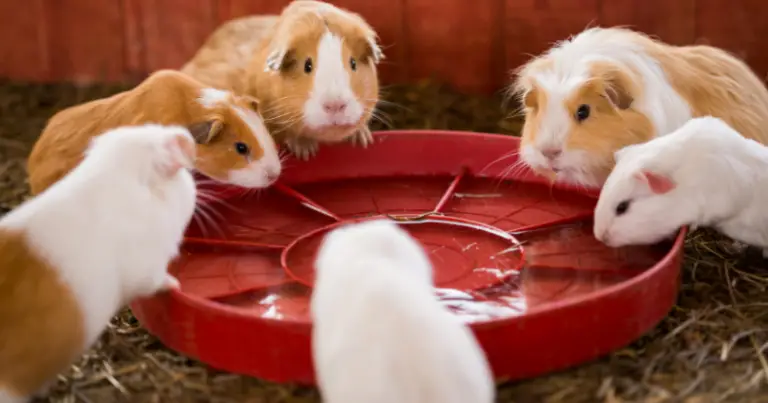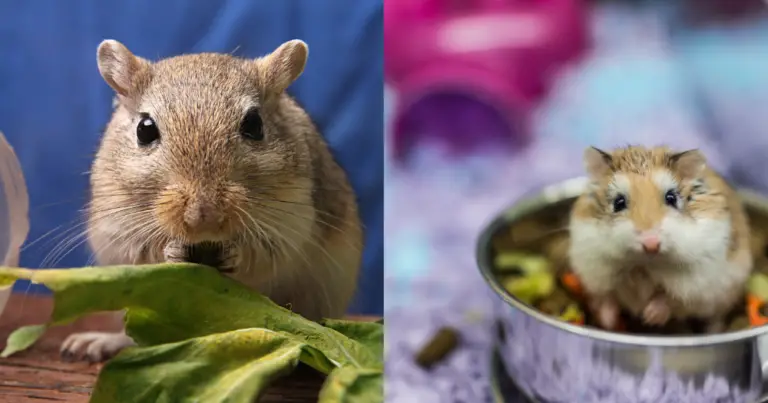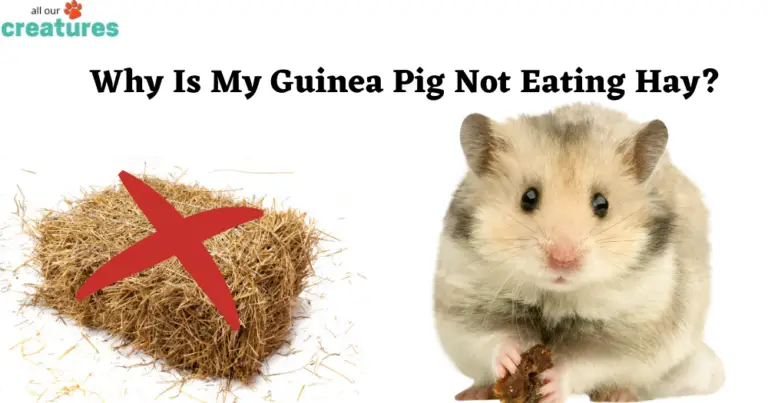What Can Guinea Pigs Not Eat?
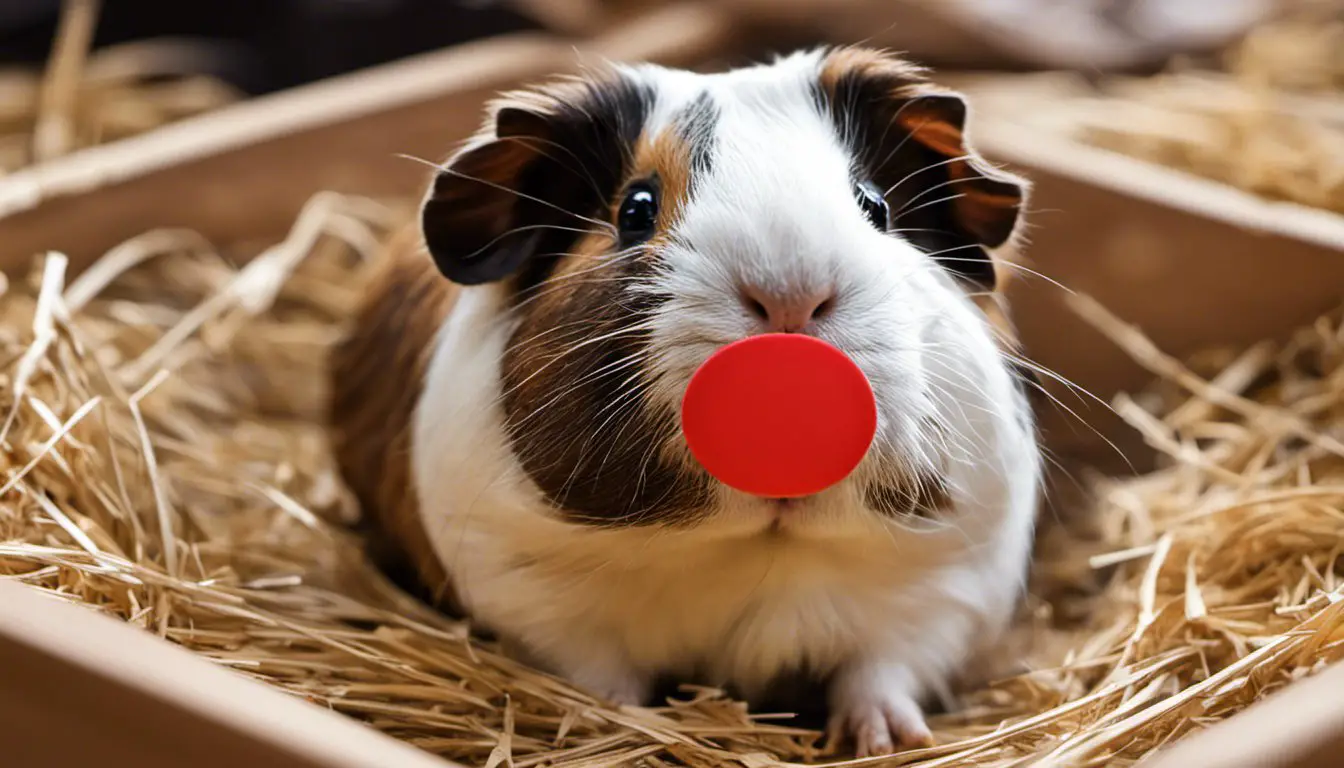
Wondering, “What can guinea pigs not eat?” Guinea pigs might be small but have big appetites for fresh fruits and vegetables. As loving pet owners, knowing what foods are safe for our little friends to enjoy is essential. Their diet should mostly consist of grass hay, which should make up around 75% of their daily intake, along with a small number of guinea pig-specific pellets, vegetables, and an occasional fruit treat. However, not all foods suit guinea pigs; some can even be harmful.
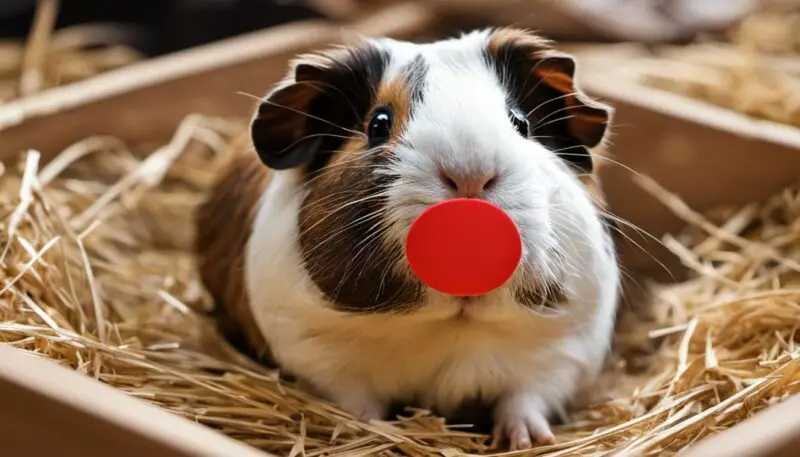
Gu guinea pigs should never eat certain foods and must be completely avoided to ensure their health and safety. These foods might range from seemingly harmless fruits and vegetables to dangerous human treats. To provide optimum care for your furry friends, it’s crucial to understand which items should be kept out of their reach.
We will discuss some harmful foods that guinea pigs cannot eat, covering items such as chocolate, avocado, and meat. By knowing what to avoid, you can keep your guinea pig happy, healthy, and well-fed, all while avoiding potential dangers lurking in their food dish.
Contents
Table of Contents
Fundamentals of a Guinea Pig Diet
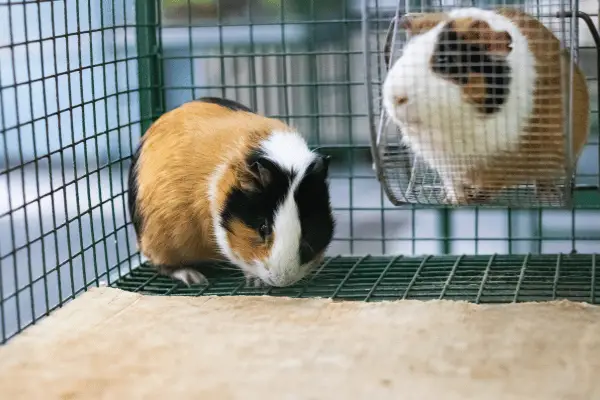
Guinea pigs are adorable little creatures, and their diet plays a significant role in keeping them healthy and happy. To ensure you’re meeting their nutritional needs, let’s casually stroll through the fundamentals of a guinea pig diet.
First and foremost, hay is the star of the show regarding your guinea pig’s diet. It should make up around 75% of their overall food intake. Hay is essential for guinea pigs as it helps with digestion and wears down their constantly growing teeth. The best types of hay for them are grass hay like Timothy, Orchard, or Meadow.
Another key component of a guinea pig’s diet is pellets. These little nuggets should account for 5-10% of their daily diet. Choosing guinea pig-specific pellets is essential, as they’ll be fortified with the right nutrients – especially vitamin C – to keep your furry friend healthy.
Now, let’s talk about vitamin C. Guinea pigs, like humans, can’t produce their vitamin C, so they must get it from their diet. You can provide vitamin C through pellets and fresh veggies like red or green peppers, broccoli, and leafy greens like kale, cilantro, and parsley. Remember to mix it up and offer different greens daily to keep their diet interesting and well-balanced!
As for water, guinea pigs need constant access to fresh and clean water. They typically need 100-300ml of water daily, which should be changed daily to ensure it remains clean and bacteria-free.
And there you have it – a casual walk through the fundamentals of a guinea pig diet. With a nice mix of hay, pellets, vitamin C-rich veggies, and fresh water, your guinea pig pal will be happy, healthy, and ready for more adventures with you.
Fruits and Vegetables to Avoid
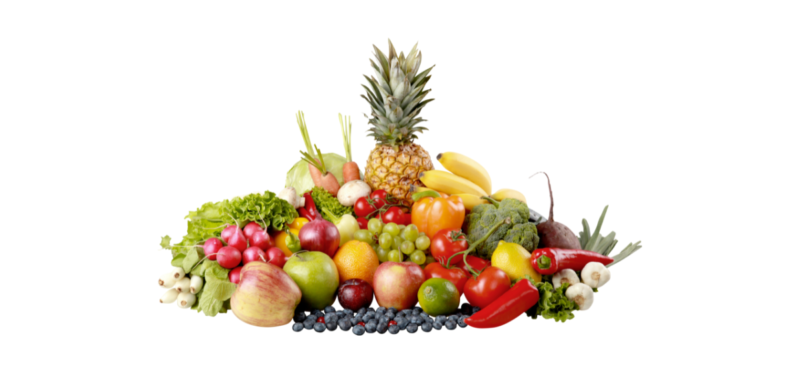
Guinea pigs enjoy a variety of fruits and vegetables, but there are some they should keep away from to maintain their health. Serve your guinea pig a balanced diet by knowing which foods to avoid.
Guinea pigs must avoid vegetables from the nightshade family, like tomatoes and potatoes. This is because their leaves and stems contain toxins that can harm these little critters. Guinea pigs should also avoid cabbage, lettuce, and broccoli, as they can cause digestive issues such as bloating and diarrhea. Additionally, avoid feeding celery due to the choking hazard caused by its fibrous strings.
Legumes like beans can lead to digestive problems in guinea pigs and should not be included in their meal plan. Avoid feeding fresh vegetables like spinach and kale in excess, given that they are high in calcium and can contribute to bladder stones. Carrots and sweet potatoes are safe for guinea pigs in small quantities, so keep portions limited due to their high sugar content.
In terms of fruits, be cautious with apples. Although guinea pigs can enjoy apple slices, make sure to remove their seeds which contain harmful substances. Similarly, kiwi is safe to feed but should be given in moderation as it may cause digestive issues when consumed in large amounts. The keyword here is moderation when providing variety in fruits for guinea pigs.
Lastly, some fruits and vegetables can be poisonous to guinea pigs. For example, they should never consume onions, rhubarb leaves, or avocados, as these can be toxic. Always double-check before introducing fresh food to your guinea pig’s diet to ensure it is safe for them to eat.
Remember, a casual and careful approach to your guinea pig’s diet will keep them healthy and satisfied!
Harmful Foods for Guinea Pigs
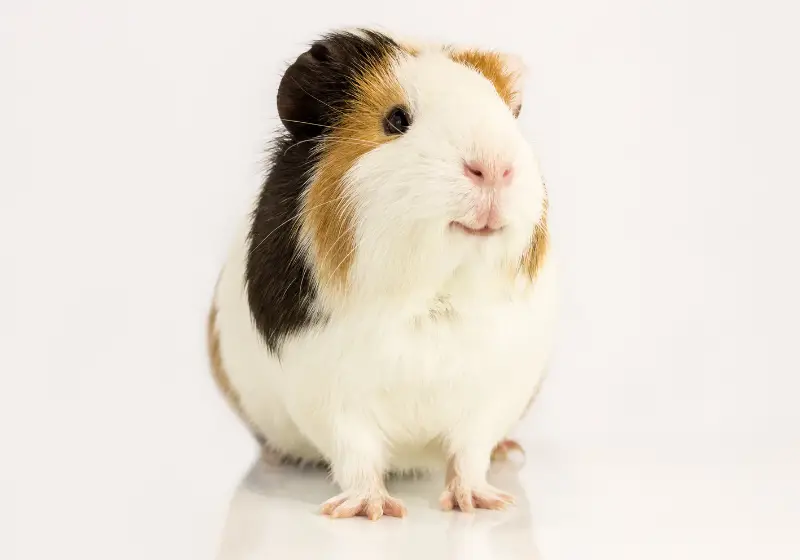
Guinea pigs may be small, but they have specific dietary needs. Knowing what foods to avoid giving these cute little creatures is crucial. Here’s a list of harmful foods that can cause health issues for your guinea pig.
First, never feed your guinea pig chocolate or anything containing caffeine, as these substances are toxic. The same goes for avocado, which is high in fat and can cause stomach upset. You should also avoid giving them seeds and nuts, as these can cause choking hazards or lead to digestive issues.
Regarding leafy greens and veggies, skip iceberg lettuce, bok choy, and rhubarb. Iceberg lettuce is low in nutrients and high in water content, while bok choy and rhubarb contain harmful compounds. Additionally, keep garlic and onions away from your guinea pig’s diet, as these can be toxic to them.
Even though guinea pigs are herbivores, not all fruits and veggies are safe to consume. Mushrooms and potatoes can be dangerous, and fruits high in sugars, like some berries, should be kept in moderation. Stick to safer options like peppers, cucumbers, cilantro, dandelion greens, and herbs like rocket.
Guinea pigs cannot digest dairy, meat, or bread. Providing them with these foods can be harmful, so sticking to their vegetarian diets is best. Also, avoid foods with empty calories or high sugar content, such as sweets or popcorn kernels.
To ensure your guinea pig stays healthy, avoid the mentioned harmful foods and opt for a balanced diet suitable for their needs. Happy feeding!
What FOODS Can Guinea Pigs NOT Eat? | POISONOUS & TOXIC Weeds, Plants | BAD Pet Foods
Health Risks and Issues
Guinea pigs can be sensitive little creatures, and feeding them the wrong type of food can lead to various health problems. One such issue is gas and bloating caused by feeding them certain vegetables like broccoli, cabbage, or cauliflower. Also, giving them high-fiber grasses and plants can help prevent digestive issues, keeping their gastrointestinal system running smoothly.
Too many high-sugar or fat treats can also cause diarrhea, loss of appetite, and obesity in guinea pigs. They must balance their diet with healthy, nutritious food like romaine lettuce, leaf lettuce, and cucumber for their overall well-being.
Calcium is another concern when it comes to guinea pig care. Excess calcium in their diet can lead to the formation of bladder stones, causing severe pain and even requiring a surgical procedure to remove them. To avoid this issue, offer low-calcium vegetables, and avoid calcium-rich treats.
Dehydration is a common problem in guinea pigs, especially if they don’t always have access to clean water. Ensure your pet always has fresh water available, and watch for signs of dehydration, such as anorexia (not eating) and a dry anus.
An improper diet makes Guinea pigs susceptible to respiratory infections from stress or weakened immune systems. A balanced diet, a clean living space, and maintaining low-stress levels can help keep respiratory infections at bay.
Dental problems are yet another health risk for guinea pigs. Their teeth continuously grow; hence, they need a diet rich in fibrous foods, like hay, to wear down their teeth and avoid overgrowth. Overgrown teeth can lead to difficulty eating, weight loss, and infections.
In conclusion, guinea pig care goes beyond just feeding them treats; it’s crucial to be aware of the potential health risks associated with their diet. Always pay attention to the food you provide, and look for any signs of discomfort or disease in your furry friend.
Providing Proper Nutrition and Care
Caring for guinea pigs means being aware of their specific nutritional needs. As a pet owner, offering a well-rounded diet is essential to keep these little critters happy and healthy. Let’s dive into the key aspects of proper guinea pig nutrition and leave out the harmful stuff.
First, guinea pigs are herbivores, so their diet should be primarily plant-based. A major component of a guinea pig’s diet is high-quality hay, which should make up around 80% of their daily food intake. Providing both timothy hay and grass hays like orchardgrass, brome, and oat is important. Fresh vegetables should also be included, contributing to no more than 20% of their diet.
One critical aspect to remember is that guinea pigs cannot produce their vitamin C, which means they depend on us, their owners, to supply it through their diet. They need around 10-50 mg of vitamin C daily, with the specific amount varying depending on age, stress, and health. Consult your veterinarian for tailored recommendations.
To ensure your guinea pigs get enough vitamin C, offer them vitamin C-rich vegetables and fruits or invest in vitamin C-fortified pellets. Avoid pellets with seeds or dried fruits, as some guinea pigs cannot eat them. Remember, moderation is key when it comes to fresh produce, so stick to serving only limited amounts of fruits and veggies.
Finally, staying hydrated is also a crucial part of guinea pig care. Make sure fresh, clean water is always available for your furry friend. Regularly check their water bottles or bowls to prevent contamination or running out of water.
By ensuring your guinea pigs have a balanced diet, plenty of water, and adequate vitamin C levels, you’re already on your way to providing exceptional care for your pets. Don’t forget to schedule regular veterinary check-ups for optimal health and wellness. Happy guinea pig parenting!
Preventing Obesity and Health Issues
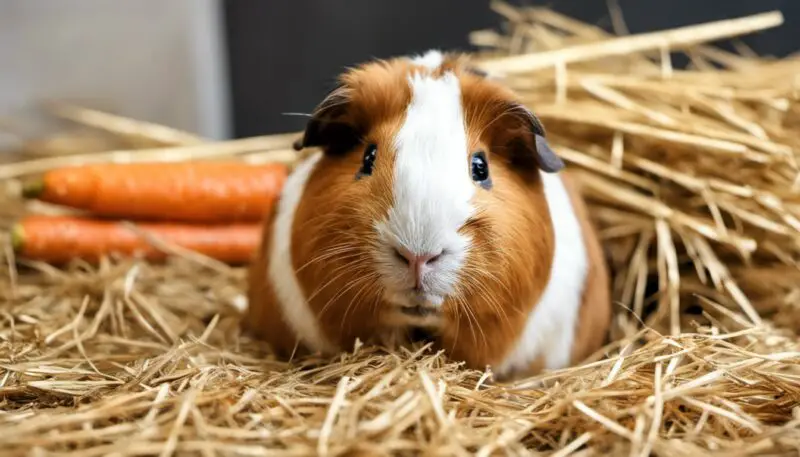
One key to keeping your guinea pig healthy is ensuring they have a proper diet. Obesity can be a concern for guinea pigs, leading to other health problems if they consume foods that are too high in sugar or fat. Some signs that your guinea pig may be experiencing issues include changes in behavior or appetite, like eating less or refusing to eat, as well as changes in fur or skin appearance. To avoid health problems, knowing what foods are safe and unsafe for guinea pigs is crucial.
What should I Avoid feeding my guinea pig unhealthy foods:
Avoid feeding your guinea pig these unhealthy foods:
Salt licks or mineral blocks
Animal byproducts
Seeds with kernels
Veggies like broccoli (in excess)
Grass hay should comprise about 75% of a guinea pig’s diet, as it is a vital staple. Other essential dietary additions include vitamin C supplements, guinea pig-specific pellets, vegetables, and water. While fruits can be given as treats, they should be provided sparingly to avoid obesity. Keep it casual, alright?
The main way to prevent obesity and health problems in your guinea pig is to be consistent with their diet, provide clean water, and maintain proper living conditions. Using gentle bedding materials, frequently cleaning and disinfecting the cage, and ensuring a low-stress environment with adequate exercise are all essential for your pet’s health and well-being.
In summary, carefully monitoring and maintaining your guinea pig’s diet, living conditions, and overall care will go a long way in preventing obesity and health issues. Your guinea pig will thank you for it! So, keep it chill and remember these tips—they’ll come in handy.
Conclusion: What Can Guinea Pigs Not Eat

So, let’s recap the key takeaways to help protect our guinea pigs from harmful foods. Remember, a guinea pig’s diet should mainly consist of grass hay. Offering your little friend safe and healthy treats is crucial.
Here are some foods guinea pigs must avoid:
- Avocado: It contains persin, which is toxic to guinea pigs.
- Chocolate: Keep your guinea pig away from this sweet treat as it’s on the top of the foods to avoid.
- Fruits high in sugar: Indulging your pet in fruit treats should be limited, as they can cause health issues for your furry friend.
Now, let’s talk about portion control. Guinea pigs can develop health problems if they consume foods high in sugar or fat. Be attentive to changes in your pet’s behavior, appetite, or appearance, as these might indicate they’re consuming the wrong foods.
Educating yourself on your guinea pig’s dietary needs ensures a safe, healthy environment. Watch out for toxic foods and check portion sizes to avoid health complications. Happy guinea pig parenting!



